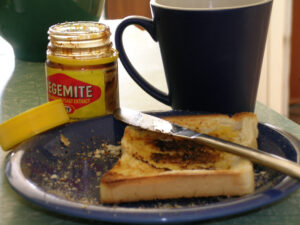by Debbie Burke
The saying “two countries divided by a common language” certainly applies to slang.
American and British slang are confusing enough. Throw in Australian slang and one needs a translator with a doctorate in linguistics to interpret.
Here’s an example I recently ran across in an Aussie news story: Dob in a hoon.
Translation: to report a driver who’s reckless and dangerous.
The story reported that the Greater Shepperton City Council and police have a “Dob in a Hoon” tip line where citizens can call in tips about dangerous drivers.
Being a writer fascinated by word origins, I headed down the rabbit hole to learn about this unusual phrase.
Hoon driving means driving recklessly, quickly, and irresponsibly. It includes street racing, fishtailing, burnouts, excessive noise to draw attention of bystanders.

Digging a little deeper into origins, I discovered the word hoon was coined by Aussie author Xavier Herbert in the 1930s and means a “hooligan” or “lout.”
What about the rest of the phrase dob in?
According to the Cambridge Dictionary, dob in means to “secretly tell someone in authority that someone else has done something wrong.”
Quick grammar review from Grammarly:
A transitive verb needs to transfer its action to something or someone—an object. In essence, transitive means “affecting something else.”
A transitive verb is one that makes sense only if it exerts its action on an object.
An intransitive verb will make sense without an object.
That makes dob in a transitive verb, where the verb action of dob in passes to the object noun hoon.
In Australian slang, dob in is comparable to the American slang terms rat out or squeal on.
The person who dobs in someone is often called a stool pigeon, canary, cheese eater, rat, informant, squealer, fink, narc.
While rooting around in the research rabbit hole, more Aussie slang sidetracked me. Here are a few examples:
If someone imbibes too much from the Bottle-O (liquor store) then gets behind the wheel, they could wind up riding in the Booze Bus (police vehicle that chases drunk drivers).
If you visit Australia, beware of the dreaded Drop Bear. This mythical beast is a carnivorous Koala-type bear that drops from trees to prey on creatures walking below.

Drop Bear attack
Photo credit: wikipedia
Aussies enjoy warning unsuspecting tourists about the Drop Bear, along with other fun Furphies (plural).
A Furphy (singular) is defined by Dictionary.com as “a false report or improbable story; rumor.”

Furphy water cart, ca 1905
Furphy is an actual brand name for traveling water tanks and sanitary disposal carts manufactured by the Furphy family of Victoria. During World War I, soldiers gathered around Furphies to gossip and spin yarns. That led to widespread slang usage of telling a furphy.
Do you think “sanitary disposal” could have inspired the term?
Those friendly, helpful Aussies also suggest repellants that supposedly protect from Drop Bear attacks. One method is to spread Vegemite behind the ears.
Vegemite isn’t slang but is an actual food product created and produced in Australia. It is made from leftover byproducts from brewing beer.
Here is a description of Vegemite from thetraveltart.com: “It looks like tar, has the consistency of thick paste, and has a salty/malty/yeasty taste to it that sounds just a bit weird but actually works – if you don’t plaster it too much!”
Applied behind the ears, Vegemite not only protects from Drop Bears, it makes a memorable cologne that’s also edible.
Those Aussies have a wicked sense of humor.


Photo credit: Sultan 11 cc-by-sa-4.0
The Drop Bear is similar to the North American “Jackalope”, another mythical creature with origins in folklore. Imagine a cross between an antelope and a jackrabbit.
Which brings me back to rabbits and falling down the rabbit hole.
Here’s an entertaining article by Elaine Zelby about the origins and usage of that particular slang.
TKZ emeritus Clare Langley-Hawthorne was raised in Australia. If Clare is online, maybe she’ll chime in with her favorite Aussie slang terms.
Pros of using slang in fiction:
- Adds authenticity;
- Adds regional color;
- Gives deeper dimension to characters and makes them unique and memorable.
Cons:
- Slang changes with the times. Twentieth century meaning may be totally different in the 21st century;
- The same slang can have different meanings in different cultures, causing reader confusion;
- May require explanation to the reader. Anything that takes them out of the story can be a problem;
- Overuse of slang is distracting and annoying.
A taste of slang in fiction goes a long way. Like Vegemite, don’t spread it too thickly.
~~~
This is my last post for 2023 before TKZ’s annual break. I’m honored to be part of this vibrant writing/reading community.
Warm wishes for a joyous holiday season with family and friends!
~~~
TKZers: How much slang do you use in your stories?
What is the most unusual slang term you’ve run across?
Do you research the origins of slang words?
Please share a few of your favorites.
~~~
Deep fakes lead to deep trouble in Debbie Burke’s thriller, Deep Fake Double Down, BookLIfe Prize Finalist. Click on the cover for the sales link.



